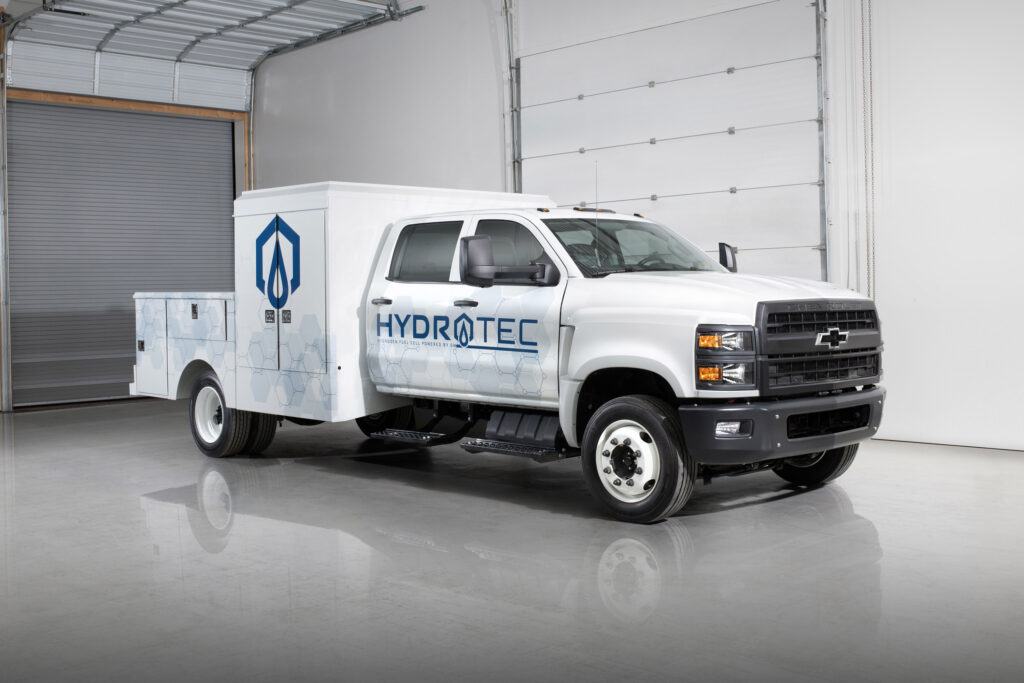Battery-electric drivetrains are ideal for passenger cars, but hydrogen fuel cells scale far better and are therefore superior for use in large vehicles. Pushing forward on this front, GM announced on Tuesday that its Hydrotec division is putting fuel cell-powered medium-duty trucks into service, and just as importantly, developing a worksite ecosystem that can keep these heavy haulers fueled up and ready to run.
This year, Southern Company, one of the largest utility firms in the U.S., will receive one such hydrogen-fueled rig. According to a GM representative, this truck will be used for demonstration purposes and testing in the state of Georgia. The utility company is scheduled to get more fuel cell-powered work trucks at an undisclosed future date.
The vehicles in question are based on the medium-duty 2024 Chevy Silverado 5500. These prototype models are expected to have a gross vehicle weight rating (GVWR) of 19,500 pounds and deliver more than 300 miles of range with a full load of hydrogen onboard, which isn’t too bad for such a large vehicle. Each truck cranks out more than 300 kilowatts — around 402 horsepower — and features an 800-volt electrical architecture.
“We view fuel cells as the ideal solution for electrifying the largest of vehicles, and our Hydrotec power cubes are the perfect zero-emissions complement to our Ultium batteries,” said Charles Freese, GM executive director of Global Hydrotec, in a media presentation. He added, “Hydrotec fuel cell systems also offer a balance of affordability, durability and efficiency. When combined with GM’s world-class ability to manufacture rugged, high-quality propulsion systems at scale, we feel GM is in a unique position to provide fuel cell technology and make it available for some of the hardest-working vehicles on the planet.”

Despite being under development for literally decades, hydrogen fuel cells are still a nascent technology, but with performance figures like the ones listed above, these Silverado 5500s can give traditional, diesel-powered medium-duty rigs a run for their money, all while being quieter and far cleaner. Fuel cells produce zero noxious emissions, in fact, the only thing that comes out of their tailpipes is pure water.
This squeaky-clean powertrain technology has numerous advantages over internal combustion, but hydrogen availability is still their Achilles’ heel. You can get gasoline and diesel at practically every street corner, but nature’s lightest element? Not so much. Helping alleviate this issue, GM is also developing a so-called worksite ecosystem, a microgrid that includes hydrogen refueling stations for these medium-duty trucks and stationary power generators that can be used to recharge electric vehicles. With electrolyzes, these stations can even generate hydrogen on the spot.
“While battery technology works very well for electrifying passenger vehicles and local fleets that carry lighter payloads, it is not an effective solution for applications with extreme towing and payload needs, like many medium-duty trucks,” noted Freese. He also explained that these applications also often need exportable power for running other equipment. Hydrogen is an effective alternative to battery-electric powertrains in these sorts of applications.
“With funding awarded from the Department of Energy’s SuperTruck 3 program and supported by the $26 million cost-share agreement, we will design, engineer and develop a fleet of hydrogen fuel cell medium-duty trucks to demonstrate how the capability and strength of our fuel cells can help real-world fleet customers,” said Jacob Lozier, program manager of performance variants at GM. He noted that this five-year program is partially supported by the U.S. Department of Energy, though the automaker will cover the remainder of the estimated $65 million price tag.
Neatly summarizing the importance of this announcement, Freese said, “With rapid refueling, outstanding payload, extended towing range and nearly silent operation, fuel cells can help electrify many industries, including those served by vocational vehicles, like municipal service vehicles and farming equipment.” Hopefully GM’s latest fuel cell-powered trucks live up to what’s promised and help usher in a cleaner, greener future.

